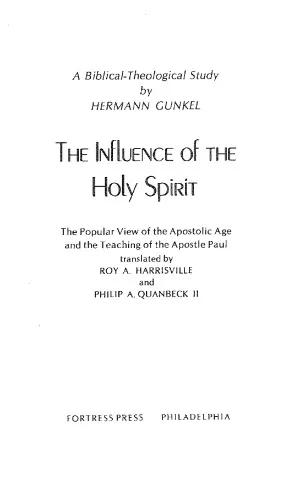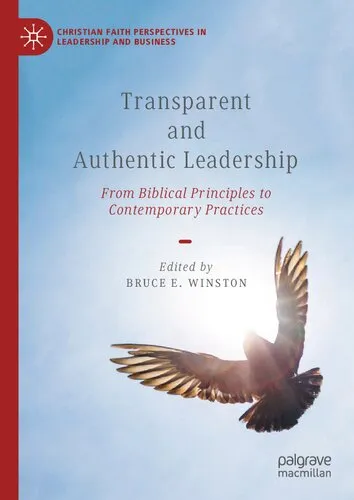The Influence of the Holy Spirit: The Popular View of the Apostolic Age and the Teaching of the Apostle Paul: A Biblical-Theological Study
4.5
بر اساس نظر کاربران

شما میتونید سوالاتتون در باره کتاب رو از هوش مصنوعیش بعد از ورود بپرسید
هر دانلود یا پرسش از هوش مصنوعی 2 امتیاز لازم دارد، برای بدست آوردن امتیاز رایگان، به صفحه ی راهنمای امتیازات سر بزنید و یک سری کار ارزشمند انجام بدینکتاب های مرتبط:
معرفی کتاب "The Influence of the Holy Spirit: The Popular View of the Apostolic Age and the Teaching of the Apostle Paul"
کتاب "The Influence of the Holy Spirit: The Popular View of the Apostolic Age and the Teaching of the Apostle Paul: A Biblical-Theological Study" نوشتهی هرمان گونکل یکی از برجستهترین آثار در زمینه مطالعات الهیاتی و کتابمقدسی است. این اثر به صورت دقیق و علمی به تحلیل تأثیر Holy Spirit در تفکر و باورهای دوران Apostolic Age و همچنین آموزههای Apostle Paul میپردازد. در این کتاب، گونکل با استفاده از روششناسی عمیق و تخصصی، بینش جدیدی در مورد مقوله Holy Spirit و چگونه گسترش مفاهیمی مانند وحی، هدایت و ایمان ارائه میدهد.
خلاصهای از کتاب
این کتاب در سه بخش اصلی تنظیم شده است. در بخش ابتدایی، نویسنده به بررسی دیدگاههای رایج و مردمی (Popular View) درباره Holy Spirit در دوران Apostolic Age، یعنی دوره اولیه پس از زندگی و مرگ مسیح، میپردازد. این دوره زمانی با پویاییهای خاصی شناخته میشود که در آن افراد و گروهها بهطور مستقیم تجربههایی از حضور الهی داشتهاند. گونکل معتقد است فهم این دوره به شناخت بهتر تأثیر Holy Spirit در تفکر مسیحیان اولیه کمک میکند.
در بخش دوم، تأکید نویسنده بر آموزهها و دیدگاههای Apostle Paul نسبت به Holy Spirit است. Apostle Paul یکی از جالبترین و تأثیرگذارترین نویسندگان کتاب مقدس است و تحلیل گونکل شامل درک بیشتری از جنبههای مختلف Holy Spirit است که در نامههای پولس دیده میشود. نویسنده به جزئیات زیادی وارد شده تا نقشی که Holy Spirit در بخشهای همچون عدالت، هدایت معنوی، و ساختار کلیسا ایفا میکند، بررسی کند.
در نهایت، بخش سوم یک تحلیل الهیاتی جامع از این موضوع ارائه میکند. تأکید این بخش بر سنتهای دینی، تفاوتهای فرهنگی و نحوه ادغام Holy Spirit به عنوان بخش اصلی ایمان مسیحی در عقاید عمومی و شخصی است.
نکات کلیدی
- بررسی تفاوت درک مردم از Holy Spirit در دوره Apostolic Age با آموزههای Apostle Paul.
- تحلیل روند تأثیرگذاری Holy Spirit در وحی و ایمان انسانها.
- تأکید بر رویکردی تاریخی-الهیاتی برای درک معنای Holy Spirit.
- بررسی جنبههای کاربردی Holy Spirit در زندگی افراد و کلیسا.
جملات معروف از کتاب
"The Holy Spirit as the divine presence brings meaning and purpose to the human life and lays the foundation for a collective spiritual journey."
"In the Apostolic Age, the Holy Spirit was not merely a theological abstraction but a living reality shaping communities and lives."
چرا این کتاب مهم است؟
این کتاب برای دانشجویان الهیات، محققان کتاب مقدس، و افرادی که به درک عمیقتری از آموزههای اولیه مسیحیت علاقه دارند، منبع بسیار ارزشمندی است. تحلیل علمی و تاریخی گونکل به خوانندگان کمک میکند تا یاد بگیرند چگونه Holy Spirit در شکلگیری مفاهیمی چون هدایت، عدالت، و نجات نقش داشته است. در عین حال، این اثر الهامبخش افرادی است که به دنبال بینش معنوی یا حتی کاربردهای عملی از آموزههای کتاب مقدس هستند. کتابی که هم با دقت علمی و هم با ادبیاتی روان و آموزنده نوشته شده، همچنان یکی از منابع اصلی مطالعات درباره Holy Spirit باقی میماند.
با مطالعه این اثر، نهتنها تاریخ مسیحیت اولیه را درک میکنید، بلکه از نقطهنظر الهیاتی نیز برداشتهای جدیدی کسب میکنید که میتواند به تجربه روحانی شخصیتان عمق بیشتری ببخشد.
Introduction to "The Influence of the Holy Spirit"
"The Influence of the Holy Spirit: The Popular View of the Apostolic Age and the Teaching of the Apostle Paul: A Biblical-Theological Study" is a profound exploration of the theology surrounding the role of the Holy Spirit in the early Christian Church. As one of the pioneering works of biblical theology, this book examines how the Spirit of God was understood both in the popular imagination of the Apostolic Age and within the sophisticated theological framework of the Apostle Paul. My goal in writing this text was to bridge the gap between historical religious thought and contemporary theological inquiry, offering a detailed exegesis on the subject of pneumatology. This foundational study provides clarity and depth on the spiritual dynamics that shaped early Christianity, ultimately influencing Christian thought and practice for centuries to come.
Written with meticulous scholarship, the book delves into two critical perspectives: the popular oral culture of the Apostolic Age, which often emphasized the Holy Spirit in a charismatic and experiential manner, and Paul's more systemic and theological treatment of the Spirit's role in Christian life and salvation. Through careful examination of Paul's epistles and contemporaneous accounts, this book seeks to illuminate how one of Christianity's essential doctrines developed through history and theological reflection.
Detailed Summary of the Book
This book is divided into two primary sections: the cultural-historical perspective of the early Apostolic Age and Paul's theological articulation of the Holy Spirit’s role.
The first section addresses how the Holy Spirit was understood in the collective imagination of early converts and communities. It reflects on themes like the Spirit's tangible manifestations in ecstatic prophecy, miracles, and glossolalia (speaking in tongues). These phenomena were integral to the earliest believers' understanding of God's direct engagement with His people. The Holy Spirit, in this context, was a visible, almost tangible agent of divine activity—a mark of God's immediate presence among His followers.
The second section focuses on Paul's writings, where the concept of the Holy Spirit is intellectually systematized into Christian theology. Paul emphasizes the Spirit's role in justification, sanctification, and unifying the body of Christ. He develops a doctrine that transcends the popular experiential view, presenting the Spirit as the guarantor of salvation, the transformative power that shapes believers into the image of Christ, and the agent behind the Church's collective identity. Through an exegetical analysis of texts such as Romans 8, Galatians 5, and 1 Corinthians 12-14, I unpack Paul's rich theological vision of the Spirit operating in both individual lives and the collective Church.
Key Takeaways
- The Holy Spirit, in the Apostolic Age, was perceived both as a source of individual empowerment and communal unity.
- Pauline theology advanced a systemic understanding of the Spirit as the foundation of Christian identity and salvation.
- The book explores the shift from a charismatic and experiential view of the Spirit to a doctrinal and theological comprehension within Christianity.
- Through Paul's epistles, the Spirit is revealed to be central to God's plan for redemption and transformation in human lives.
- A balance between spiritual experience and theological understanding is pivotal for grasping the role of the Holy Spirit in the Christian tradition.
Famous Quotes from the Book
"The Spirit of God in the Apostolic Age was not merely a theological abstraction but a source of living power—a force that altered lives, propelled the Church into existence, and bore witness to the presence of God among His people."
"Paul’s concept of the Holy Spirit reveals a profound truth: that God is not distant but intimately involved in the transformation of the believer and the life of the Church."
"In the Apostolic view, the Spirit was a visible fire; in Paul’s theology, it became a refining flame."
Why This Book Matters
This work holds enduring significance for theologians, pastors, and lay readers alike. It bridges the chasm between historical cultural phenomena and systematic theology, providing a richer understanding of how one of Christianity’s core doctrines developed. Furthermore, it unearths valuable insights about how contemporary Christians might experience and articulate the work of the Holy Spirit in their lives today.
The book also addresses a perennial challenge: reconciling personal spiritual experience with structured theological frameworks. By examining Paul’s theology in dialogue with the vibrant spirituality of the Apostolic Age, it inspires readers to reflect on the role of the Spirit in modern Christian life—personally and corporately.
Moreover, as Christianity continues to grow globally in regions where charismatic and experiential spirituality is prominent, this book offers a nuanced perspective that connects the richness of experiential faith with the depth of theological wisdom. Its relevance spans across denominational and cultural boundaries, highlighting the universality of the Spirit’s work in Christian belief and practice.
This introduction serves as a gateway into the profound themes explored in the book, demonstrating how essential the knowledge of the Holy Spirit is for understanding Christian theology and history.
دانلود رایگان مستقیم
شما میتونید سوالاتتون در باره کتاب رو از هوش مصنوعیش بعد از ورود بپرسید
دسترسی به کتابها از طریق پلتفرمهای قانونی و کتابخانههای عمومی نه تنها از حقوق نویسندگان و ناشران حمایت میکند، بلکه به پایداری فرهنگ کتابخوانی نیز کمک میرساند. پیش از دانلود، لحظهای به بررسی این گزینهها فکر کنید.
این کتاب رو در پلتفرم های دیگه ببینید
WorldCat به شما کمک میکنه تا کتاب ها رو در کتابخانه های سراسر دنیا پیدا کنید
امتیازها، نظرات تخصصی و صحبت ها درباره کتاب را در Goodreads ببینید
کتابهای کمیاب یا دست دوم را در AbeBooks پیدا کنید و بخرید
1395
بازدید4.5
امتیاز0
نظر98%
رضایتنظرات:
4.5
بر اساس 0 نظر کاربران
Questions & Answers
Ask questions about this book or help others by answering
No questions yet. Be the first to ask!






![The Ultimate iOS Interview Playbook: Conquer Swift, frameworks, design patterns, and app architecture [Team-IRA]](https://s3.refhub.ir/images/thumb/The_Ultimate_iOS_Interview_Playbook__Conquer__29925.webp)







